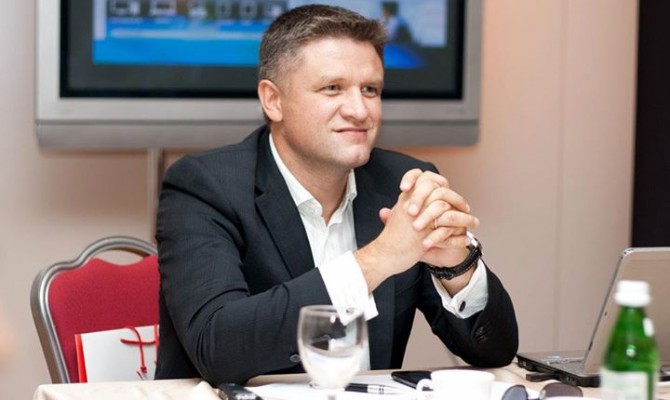Technology
managementA man from Microsoft will help the president make Ukraine computer-assisted

CEO of Microsoft Ukraine Dmytro Schymkiv announced yesterday that he resigned from his post having worked for the U.S. corporation for seven and a half years. “We did a lot together for the development of Ukraine,” he wrote on Facebook.
At the same time, the media and social networks reported on the same day that Shymkiv would be appointed to the office of Deputy Chair of the Presidential Administration for Administrative, Social and Economic Reforms, referring to a source in the PA. Shymkiv has not yet commented on such information. “I received an offer to work in a completely new and exciting position,” he added on Facebook.
Several sources representing the IT market, who called Shymkiv to congratulate him on his appointment, confirmed the information on his future position in the PA in conversations with Capital. Many rivals in this business have only positive things to say about Shymkiv.
“He is a very orderly person, a patriot. He is also dynamic and progressive, even a go-ahead,” says IT businessman, former Chief Operations Officer at Ciclum Roman Khmil.
Enticing, but expensive
Lately, Shymkiv has been interested in major infrastructure projects in the IT and telecommunications sectors, in particular, projects aimed at implementation of an e-government. In June, he signed a memorandum with the Lviv City Administration for the launch of City Control Panel project based on Microsoft solutions.
Khmil believes that implementation of e-government is one of Shymkiv’s key tasks in his new position. However, Director of the Ukrainian Network Information Center Yuriy Honcharuk says the Presidential Administration is not the body responsible for the country's reforms in the IT sector. He says this most likely refers to president’s internal consultations in this sphere. “The Cabinet of Ministers is responsible for the implementation of e-government,” he added. During recent reforms in the country they created the Agency for Implementation of E-government controlled by the Minister of Regional Development, Construction and Housing Utility Services of Ukraine Volodymyr Groisman. Although Khmil says for Shymkiv it is important to convey his idea and not to have some specific powers.
If Shymkiv proceeds with the promotion of Microsoft’s solution for the development of e-government, it might be a costly affair for the country. “We argued on this issue. I tried to convince him that the purchase of open source software for the state would be more profitable, but he insisted that Microsoft is better,” said Khmil, who is looking forward to continuing the dialogue, as he wants to know whether Shymkiv’s opinion has changed since their last meeting.
Khmil says the solutions of Microsoft will cost on average of 30% more than Linux-based software. This is the exact amount saved by Argentina. Some large companies such as PrivatBank also prefer using open source software in order to save money.
Kids buy tablets!
In public, Shymkiv always tried to show that he is a Ukrainian patriot. But in reality this often was a disguise for Microsoft’s purely commercial interest. So, at the end of 2013 Shymkiv appeared at a conference accompanied by the managers of the Open World national project (providing school students with tablets, high-speed Internet and interactive educational materials). At the event it was announced that Microsoft Ukraine indirectly invested UAH 15 mn into the project. The CEO explained that Surface RT tablets would be sold to students for UAH 3,000, which is less than their production cost. He claimed the average price for them on the global market is UAH 4,500.
At the same time, competitors of Microsoft Ukraine have shown their own unprecedented generosity. Shortly before this, Microsoft officially wrote off a US $900 mn loss on Surface RT and started offering tablets at super low prices worldwide, said Director of the Computer Systems Department at Navigator Oleksandr Kostyuk. In other words, the corporation was trying to sell the product by any means in order to avoid its demise. Open World was none other than free advertising for the failed product, which was highly recommended for use in a major educational project.
Help the U.S.
Shymkiv has also played an essential role in the fact that the U.S. Department of State recognized Ukraine as the world’s trickiest pirate last year, which affected the country's image on the global arena. It was mostly a lopsided decision. Impressive quantity of illegal software installed on computers in government agencies was one of the reasons for initiation of an international investigation of Ukraine. At the same time, data collected in Ukraine by Microsoft and statistics of the State Service of Intellectual Property were very different. Shymkiv assured that 70% of computers in government agencies had no obligatory licenses and the specialized department stated that there were only 33% such PCs and the agencies mostly used free software. But the U.S. entirely relied on the information provided by Microsoft. Shymkiv said he planned to sue the Ukrainian government in international courts and demand compensation, estimating damages of US $200 mn. But he did not procure even a minimum amount from the national budget.
Honcharuk believes that Ukraine has a prospect of following the path of certain European countries, such as Germany, where open source software is used very ambitiously. He says it helps saving approximately 50% of the amount that would be spent on Microsoft, though he admits that the prices of solutions developed by the Microsoft are rapidly falling.



 of the agreement of syndication with Financial Times Limited are strictly prohibited. Use of materials which refers to France-Presse, Reuters, Interfax-Ukraine, Ukrainian News, UNIAN agencies is strictly prohibited. Materials marked
of the agreement of syndication with Financial Times Limited are strictly prohibited. Use of materials which refers to France-Presse, Reuters, Interfax-Ukraine, Ukrainian News, UNIAN agencies is strictly prohibited. Materials marked  are published as advertisements.
are published as advertisements.